Jeffrey Epstein was said to be a witness against Wall Street; an FBN investigation suggests otherwise
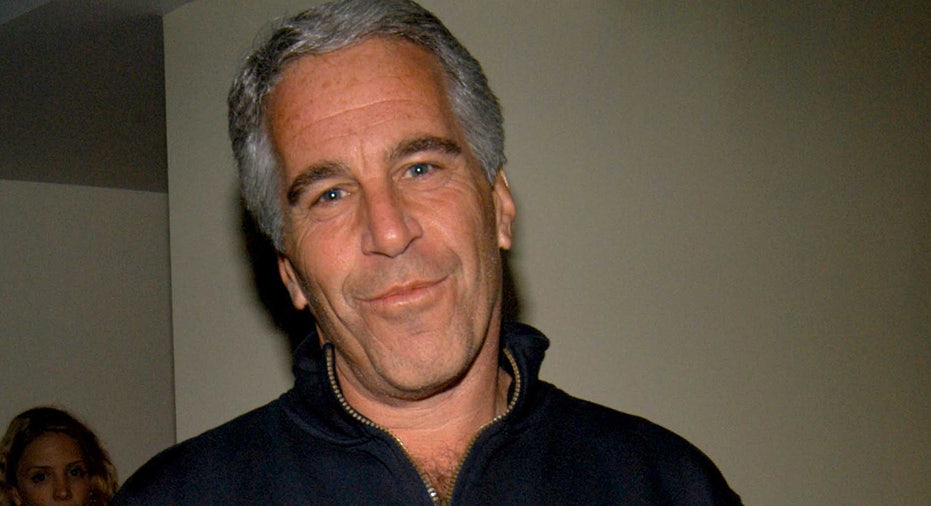
NEW YORK, NY - MAY 18: Jeffrey Epstein attends Launch of RADAR MAGAZINE at Hotel QT on May 18, 2005. (Photo by Neil Rasmus/Patrick McMullan via Getty Images)
How did convicted sex offender and billionaire money manager Jeffrey Epstein receive a relatively mild sentence for a crime that involved underage girls?
As the decade-old case continues to make headlines, one rationale goes something like this: Epstein, a friend of former President Bill Clinton and President Donald Trump, was able to serve just 13 months in prison after being accused of sexually abusing more than 30 minors over a period of eight years by hiring an O.J. Simpson-like dream team of high-priced legal talent, while using his inside knowledge of Wall Street to make him a valuable informant in the government’s crackdown of abuses following the 2008 financial crisis.
According to numerous published reports, Epstein, 66, was said to be a key witness in the prosecution of two Bear Stearns hedge fund managers, Ralph Cioffi and Matthew Tannin. Both men were charged with securities fraud after the collapse of a pair of hedge funds they oversaw – one of the events that prosecutors believed sparked the 2008 financial crisis.
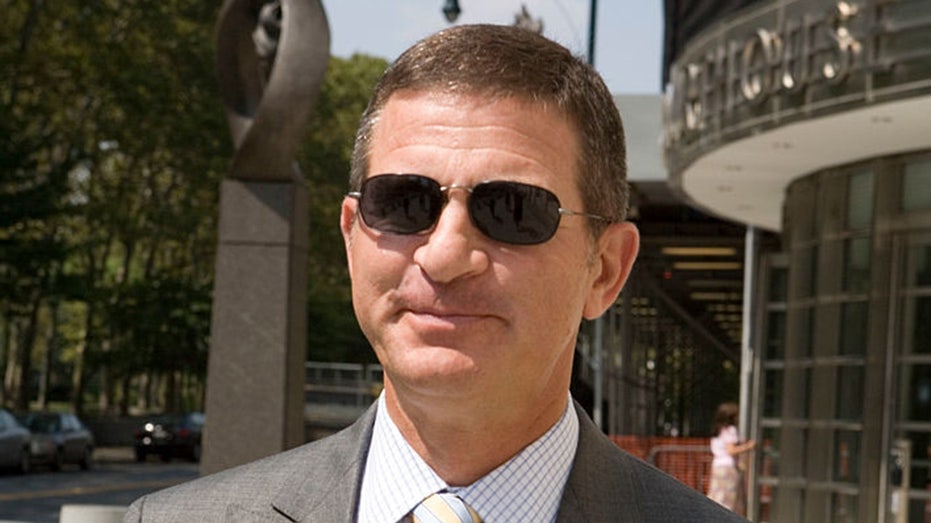
Former Bear Stearns Cos. hedge fund manager Ralph Cioffi leaves Federal Court after a hearing in Brooklyn, New York, on July 18, 2008. (Photo by Ramin Talaie/Corbis via Getty Images)
Epstein knew a lot about Bear Stearns. He worked at the firm early in his career and even invested a chunk of his enormous net worth in the hedge funds under investigation. Meanwhile, the notion that Epstein agreed to cooperate on the federal investigation of Wall Street crimes provided at least some logic behind what many legal experts believe was a sweetheart deal for sex crimes involving minors – if, of course, it were true.
But a FOX Business investigation shows that Epstein did not provide any meaningful cooperation to obtain his relatively light sentence in the hedge fund case or likely any case tied to the financial crisis, according to numerous people with direct knowledge of the matter. In fact, Epstein’s cooperation with prosecutors does not appear to extend beyond supplying state and federal investigators with information involving his own case, these people add.
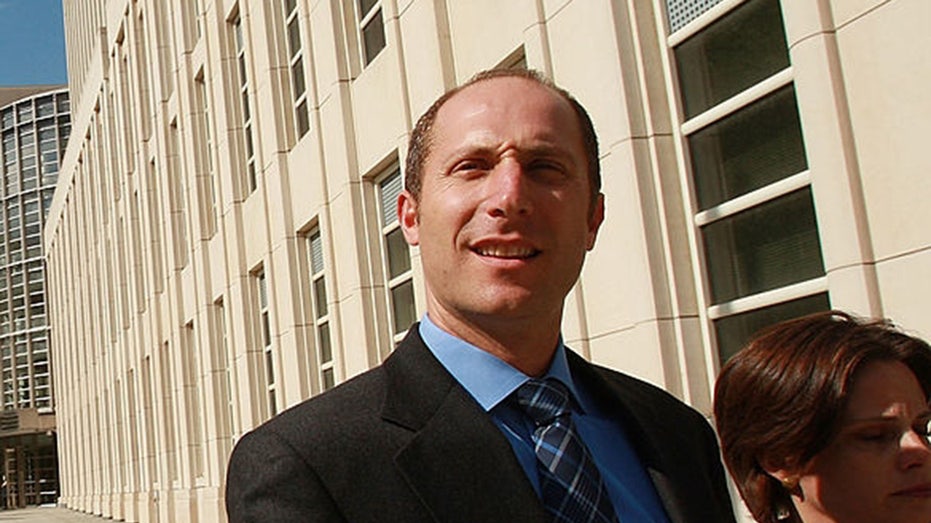
BROOKLYN, NY - JUNE 19: Matthew Tannin walks out of a Brooklyn court house after posting bail June, 19 2008 in the Brooklyn borough of New York City. Former Bear Stearns hedge fund managers Ralph Cioffi and Matthew Tannin were arrested early this mor
This revelation – which has yet to be reported – is the product of interviews with a dozen people involved in the Epstein case, from former prosecutors to various lawyers involved in the matter, and people with direct ties to Epstein himself. It comes as the case – and the circumstances behind Epstein’s sentencing agreement – continues to make national headlines with additional alleged new victims coming forward and the courts reviewing the propriety of the agreement he cut with prosecutors.
"It would have been a great thing if Epstein had helped prosecute (Cioffi and Tannin) or if he had cooperated in any investigation," Alan Dershowitz, one of Epstein’s attorneys on the infamous case, told FOX Business. "We would have been touting that if he had [cooperated]. The idea that Epstein helped in any prosecution is news to me."
Dershowitz, a celebrity attorney and Harvard law professor, said he’s no longer representing Epstein, but another member of the original legal team, Jack Goldberger, still is. Goldberger told FOX Business: "Mr. Epstein was never spoken to by any of the authorities on this subject. He was a very large investor. No more, no less."
One of the former assistant U.S. attorneys on the Bear Stearns hedge fund case concurred.
"Bottom line, I have no knowledge of Epstein cooperating in any way in the Bear Stearns case," the former prosecutor said in an interview, speaking under the condition of anonymity. "There was no reason to use him."
A person close to Epstein with direct knowledge of the matter was even more emphatic about Epstein's cooperation in any financial crisis prosecution: "It’s b------t."
The notion that Epstein provided no help to the government in post-crisis Wall Street prosecutions – or possibly any prosecution for that matter – will undoubtedly renew calls for a fuller examination of his sentencing from attorneys representing victims as new evidence emerges. If Epstein did not supply prosecutors with information on Wall Street cases, it might also bolster the argument made by attorneys for the alleged victims that federal investigators simply caved to a billionaire businessman with connections to some of the most influential people in the country.
"We have never received explanation from the government as to why he got the deal," said attorney Jack Scarola, who represents Epstein’s accusers. "What we are suggesting is the federal government needs to start all over again. The victims deserve an opportunity to be heard."
And momentum for a new case is building. This week a federal appeals court in New York is expected to unseal court documents that could reveal new details about the underage sexual abuse allegations against Epstein and his 2008 plea deal. Just last month, Florida U.S. District Judge Kenneth Marra ruled that the federal prosecutor on the case, former Miami U.S. Attorney Alexander Acosta (currently the U.S. labor secretary) violated the victims’ rights by cutting a deal with Epstein’s lawyers without letting the victims know.
CLICK HERE TO GET THE FOX BUSINESS APP
Acosta has said the plea deal was both vetted with his superiors in the Justice Department and reflected the lack of evidence to bring a strong federal case. Still, the Justice Department has opened an investigation into Acosta and the department’s handling of the Epstein case to determine if attorneys committed professional misconduct.
WHO IS JEFFREY EPSTEIN?
Even by the secretive standards of Wall Street, where traders and money managers shy away from the media to protect their investment strategies, Epstein was, for much of his career, a cipher.
Over the years, those few Wall Street types who knew Epstein said he was a hedge fund manager who tried to avoid publicity while investing money for a select few super-rich clients. But Epstein never managed a hedge fund; he began his career as a commodities trader at Bear Stearns, made firm partner, quit in the early 1980s and opened what appeared to be an investment firm. Yet aside from one client, a man named Les Wexner, who founded women’s clothing retailer The Limited, no one really knew who Epstein worked for or how much money he was running (a source close to Wexner noted he severed ties with Epstein more than a decade ago).
A person close to Epstein with direct knowledge of the matter was more emphatic about Epstein's cooperation on financial-crisis prosecution: "It’s b------t."
What appears to have forced Epstein out of the shadows was his personal life – and the company he kept. In March 2003, Vanity Fair’s Vicky Ward, in a lengthy profile of Epstein, described his secretive investment activities and his vast social network. She described him as a Ralph Lauren lookalike with one of the largest private residences in New York City – a swanky townhouse on the Upper East Side of Manhattan, in addition to other mansions scattered around the country.
Ward’s piece described Epstein’s relationships with some of the biggest players on Wall Street, such as his old bosses at Bear Stearns, the late Alan "Ace" Greenberg and James Cayne, who was CEO when the firm collapsed in 2008. He was an emerging mover and shaker in the world where politics intersected with celebrity and where his personal relationships included former President Clinton, Prince Andrew and a variety of Hollywood types whom he flew on his private jet.
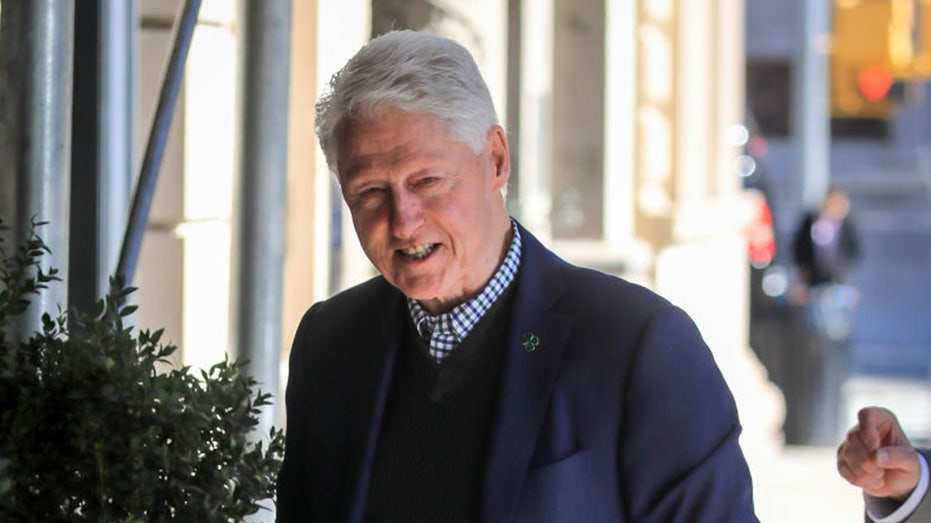
NEW YORK, NEW YORK - MARCH 17: Bill Clinton is seen visiting his daughter Chelsea Clinton on March 17, 2019 in New York City. (Photo by Say Cheese!/GC Images)
Ward also described Epstein as a billionaire bachelor, and given his more recent troubles, prophetically referred to his love life this way: "There are many women in his life, mostly young, but there is no one of them to whom he has been able to commit."
THE COLLAPSE OF EPSTEIN AND WALL STREET
For a few years, Epstein’s public persona would be defined by an occasional gossip column item or magazine piece detailing his relationships with people in the New York-Washington power circuit and his dating habits. Then-reality TV star Donald Trump, according to a 2002 New York Magazine, said of Epstein: "I've known Jeff for fifteen years. Terrific guy. He's a lot of fun to be with. It is even said that he likes beautiful women as much as I do, and many of them are on the younger side. No doubt about it, Jeffrey enjoys his social life."
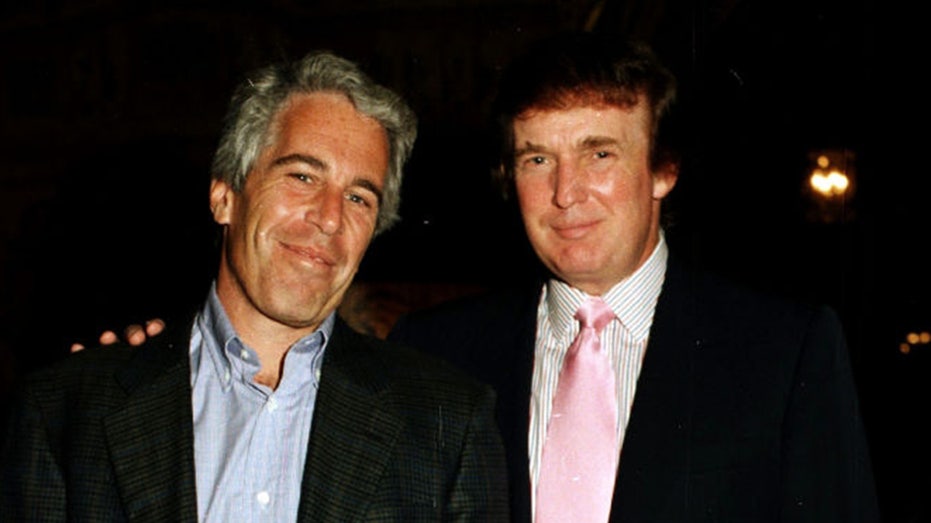
Portrait of American financier Jeffrey Epstein (left) and real estate developer Donald Trump as they pose together at the Mar-a-Lago estate, Palm Beach, Florida, 1997. (Photo by Davidoff Studios/Getty Images)
Epstein’s social life became more scandalous in 2006 when, acting on a tip, Palm Beach police arrested Epstein for multiple sexual acts with a minor at his residence in Boca Raton. And this is where Epstein’s case takes an oddly mysterious turn. The list of minors providing Epstein with what was referred to as "erotic massages" began to grow. A federal grand jury was impaneled, and the FBI launched a wide-ranging investigation into the matter of possible sex trafficking of minors.
The feds drew up a 53-page indictment, and Acosta began negotiations with Epstein’s coterie of high-powered lawyers, including former independent counsel Kenneth Starr, Dershowitz and Goldberger.
The case seemed headed to land Epstein in jail for many years given federal sentencing guidelines for such crimes. But by June 2008, a plea deal was cut with Epstein’s lawyers and Acosta for an 18-month jail sentence on state, not federal charges (he would serve just 13 and receive time off for good behavior). Among other remedies such as victim restitution, Epstein would have to register as a sex offender.
The terms, meanwhile, were kept secret from the victims.
Acosta declined to comment to FOX Business, but a person close to him reiterated what Acosta has said publicly about the matter, particularly during his confirmation hearings as labor secretary for the Trump administration. Namely, the federal case was weak because the victims weren’t transported across state lines, while others were said to have made poor witnesses, and the terms were vetted by Justice Department officials.
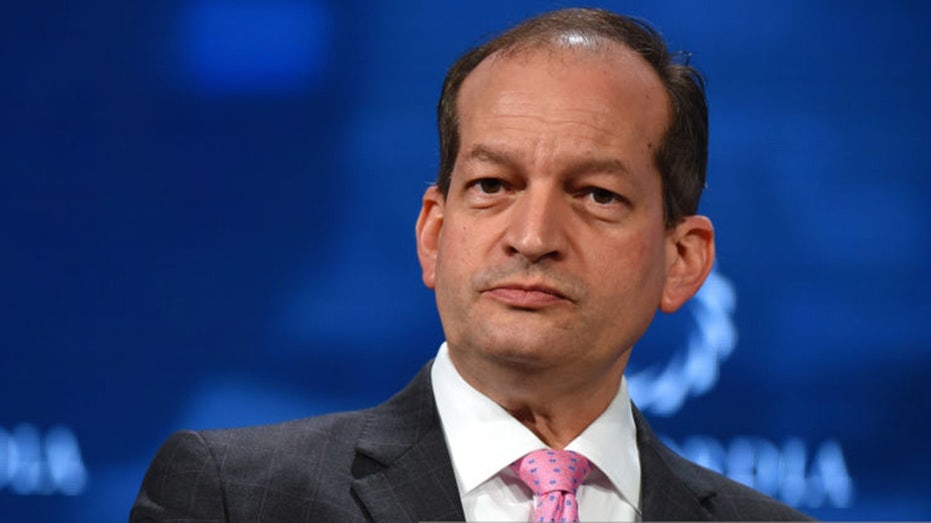
NEW YORK, NY - SEPTEMBER 25: Secretary of the U.S. Department of Labor Hon. Alexander Acosta speaks onstage during the 2018 Concordia Annual Summit - Day 2 at Grand Hyatt New York on September 25, 2018 in New York City. (Photo by Riccardo Savi/Getty
As Epstein was headed to jail in the summer of 2008, Wall Street was heading toward Armageddon – and the government was looking for the culprits. The financial collapse was in full bloom amid a flurry of risk-taking that would doom the U.S. banking system and send the economy into the Great Recession. Epstein’s old firm, Bear Stearns had already collapsed, and another bank, Lehman Brothers, was on its way, touching off a massive federal bailout of the rest of the banking system.
The fact that Bear Stearns led the demise of Wall Street wasn’t lost on federal prosecutors investigating alleged Wall Street improprieties. Bear's collapse was preceded a year earlier by the implosion of two hedge funds that specialized in mortgage-backed securities – one of the triggering events of the financial crisis because so many financial firms, including Bear Stearns itself, held on their books similar securities that were now falling in price.
Epstein was as an emerging mover and shaker in the world where politics intersected with celebrity
Prosecutors interviewed various investors in the fund and began to focus on what they believed were alleged improprieties by the funds' managers, Ralph Cioffi and Matthew Tannin.
Both were indicted by the U.S. attorney’s office in the Eastern District of New York in June 2008.
The case lasted 18 months with prosecutors attempting to make Cioffi and Tannin the faces of the financial crisis – risk-takers who hid the true nature of their investment strategy to make a quick buck. But the strategy failed miserably; despite the public uproar over Wall Street greed, Cioffi and Tannin were acquitted by a federal jury in November 2009, just a few months after Epstein was released from prison.
Epstein's name was never mentioned during the trial. But by now Epstein was identified not only as a significant investor in the ill-fated funds, but as a witness who cooperated with the government’s prosecution of Cioffi and Tannin, according to several newspaper reports.
Still, Epstein never appeared on any witness list, according to people involved in the case. Cioffi, himself, never met or spoke to Epstein, who was introduced to the fund through a senior Bear Stearns executive, according to a person with direct knowledge of the matter. The former federal prosecutor on the case told FOX Business that to the best of his recollection Epstein's name never came up as a potential witness.
In fact, Epstein was never mentioned in the Cioffi-Tannin indictment, despite several media reports stating he was identified obliquely as "Major Investor #1," according to a person involved in Cioffi’s legal defense.
So how did Epstein’s name emerge as a key federal witness? Some connecting of the dots appears to be at work. An FBI memo dated September 2008 stated, "Epstein has also provided information to the FBI as agreed upon." But a person close to Epstein says that references to Epstein’s cooperation in providing the feds with information were about his own case, and nothing more.
A person close to Cioffi believes the Justice Department needed to justify Epstein’s lean sentence by leaking that he was a cooperator and helped the government's financial-crisis crackdown particularly after the meltdown led to the Great Recession and widespread resentment of Wall Street. "He never was a witness," this person said. "That was used as an excuse by the Justice Department for his early release and someone planted that story."
Another question that will likely be asked in the coming days: How did Epstein escape more serious punishment if he wasn't helping the government on other matters? Much of the attention will be focused on his connections to people like Clinton and now-President Trump. But Epstein's deal was hashed out by the Bush administration's Justice Department, which wouldn't necessarily be impressed by the former president or the current one, who was at the time a reality TV star.
Lawyers for the victims argue that Epstein's case underscores the inequities of the justice system; many of the victims were poor kids from South Florida where the billionaire Epstein had his mansion.
Dershowitz, for his part, offers this explanation: The case against Epstein, at least at the time it was brought, was a relatively weak one.
"We were able to persuade the government that there was no federal jurisdiction ... Acosta was influenced by the fact that the federal government had a weak case," he said, adding: "People are accusing Epstein of things he wasn't initially accused or guilty of."




















